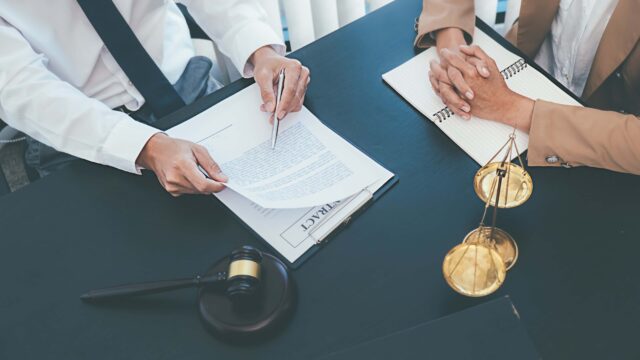When you are reading through your credit report, you may be shocked to discover another person’s name on it. It can be difficult to know what to do when this happens. To help you, read through this article.
The presence of another person’s name on your credit report could mean a number of things. Read through the following examples of what it could signify.
Incorrectly Spelt Names
While uncommon, your name might be misspelled on your credit report. This could involve incorrect letters, a wrong middle initial, or even a completely different variation of your name. Don’t worry; this is usually a simple typo and can be fixed. Here’s what to do:
- Identify the Reporting Issue: Check all three credit bureaus (Experian, Equifax, and TransUnion) to see if the misspelling is consistent. This helps determine whether you need to contact one creditor or multiple.
- Contact the Creditor: Reach out to the company that reported the incorrect name (e.g., bank, credit card issuer) and explain the situation. Provide your correct name and supporting documentation like your driver’s license or Social Security card for verification.
- Request Correction with Credit Bureaus: While the creditor should notify the credit bureaus of the correction, proactively filing a dispute with each bureau where the error appears can speed up the process. Here’s how:
- Online: Visit the dispute centers for Experian, Equifax, and TransUnion
- By Mail: Find the dispute address on your credit report or the bureau’s website.
Follow Up: It may take a few weeks for changes to appear. Review your credit reports again after 30-45 days to ensure the updates are reflected.
Additional Tips:
- Common Variations: If you regularly use a nickname (e.g., “Bob” for “Robert”), let creditors know in advance to avoid confusion.
- Severe Misspellings: If the error significantly alters your name, consider monitoring your credit more closely for potential identity theft.
You will have to bear in mind that your information will not be immediately changed. Instead, it may take a few weeks for you to receive a credit report with your name spelled correctly.
Variations Of Your Name
What may appear to be someone else’s name on your credit report could simply be a variation of your name. For example, this could be a surname that you no longer use. This could be because you have since gotten married. Your maiden name may still be used on your credit report.
In this example, you will not need to worry. You may just need to wait for the records to update. If it takes a while for this to happen, you can phone up the company with which you have an account.
Another form of name variation that may appear on your credit report is a nickname or a shortened version of your name. For example, if your name is William, your name could be printed as Will.
Likewise, it could be the other way around. If you go by the name Alex, your credit report could be written as Alexander. Again, if you want to change your name, merely call the appropriate company.
These companies will often use various aliases, which represent different variations of your name. If you do have a name that can be shortened or elongated, it is a good idea to be consistent when applying for anything. This will prevent different variations of your name from appearing on documentation.
Financial Associations
Sometimes you might see another person’s name on your credit report due to a financial association. This means you have a shared financial account or credit history with this individual. Here’s what you need to know:
Who Qualifies as a Financial Associate:
- Spouse/Partner: If you have joint credit cards, loans, mortgages, or bank accounts.
- Co-signer or Guarantor: When you co-sign a loan or act as a guarantor for someone else’s debt.
- Authorized User: If you’ve added someone as an authorized user on your credit card.
- Not Automatic: Marriage or living with someone does NOT automatically create a financial association on your credit report. Only shared accounts matter.
- Impact on Your Credit: Your financial associate’s credit habits can affect your score. Their good payment history can help you, but late payments or missed debts can hurt both of your credit scores.
- How to Check: Review your credit reports from each bureau carefully for the “Accounts” section. Any co-borrowers or where you are an authorized user will indicate a financial association.
Protecting Yourself:
- Choose Associates Wisely: Before opening joint accounts or co-signing, consider the other person’s creditworthiness and reliability with payments.
- Monitor Your Credit: Regularly check your reports for inaccurate information or unexpected changes that might be due to your associate’s actions.
- Address Issues Proactively: If your associate has poor credit, discuss a plan for improvement. If necessary, consider removing yourself as an authorized user or severing the joint account (be aware this could have its own credit score impact).
Important Note: Laws and reporting practices around financial associations can vary. Consult a credit counselor or financial advisor for specific guidance based on your situation.
How Do I Dispute A Credit Report?
Finding inaccurate information on your credit report can be stressful, but you have the right to dispute it.
1. Contact the Credit Bureaus Directly
If you spot an error, file a dispute directly with the credit bureau reporting it. The major bureaus are Equifax, Experian, and TransUnion. You can usually dispute online, by phone, or by mail. Check their websites for specific instructions.
- Experian: https://www.experian.com/disputes/main.html
- Equifax: https://www.equifax.com/personal/credit-report-services/credit-dispute/
- TransUnion: https://www.transunion.com/credit-disputes/dispute-your-credit
2. Provide Clear and Detailed Information
When disputing, be specific. Clearly identify the incorrect item, explain why you believe it’s wrong, and include any supporting documents you have (like account statements or bills). The more evidence you provide, the stronger your case.
3. Wait for the Investigation
Credit bureaus typically have 30-45 days to investigate your dispute. They’ll contact the company that provided the information and send you a written update with the results.
Important Things to Keep in Mind
- Disputing errors is your right and it’s completely free.
- Disputes themselves won’t hurt your credit score.
- If your initial dispute isn’t successful, don’t give up. You can try again with more evidence or seek help from a credit repair firm or consumer law attorney.
Need additional help? Consider contacting a firm like us at Cook Law for more assistance.
Closing Remarks
Noticing someone else’s name on your credit report may cause you to panic. Fear not! There are many straightforward explanations for why this may have occurred. If you are worried about this, the best course of action is to reach out to your account holder and explain what has happened to them.
They will be able to help you and can update your account information.



